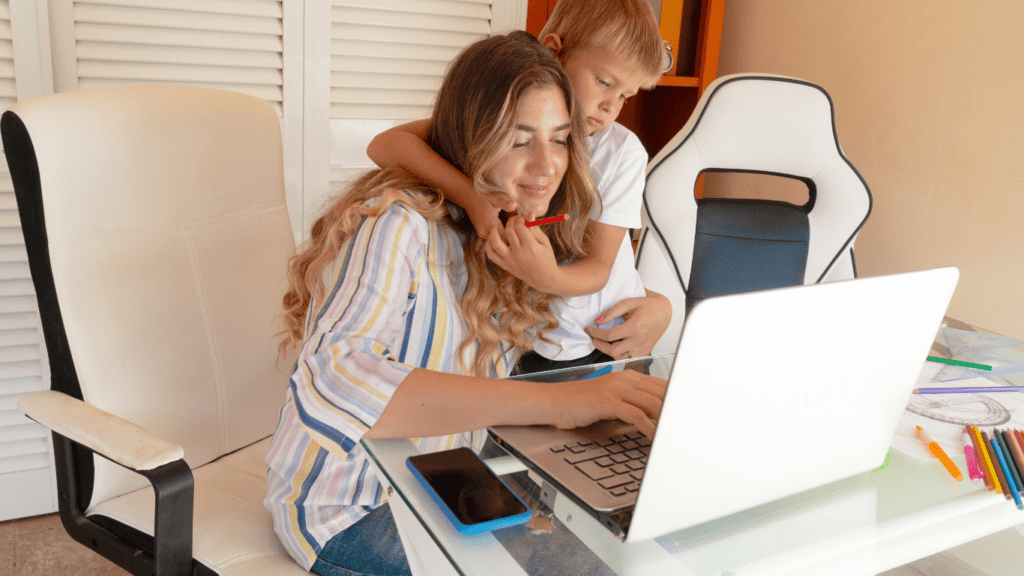Shifts in Parenting Roles
Parenting roles have shifted significantly since the pandemic. Various factors have influenced these changes, making adaptation crucial for families.
Increased Involvement of Fathers
Fathers are more involved in childcare than ever. A 2022 survey by the Pew Research Center found that 57% of dads engaged in daily childcare activities (e.g., feeding, bathing). Pre-pandemic, this figure was lower. Many fathers experienced working from home, allowing them to share responsibilities. This change fosters stronger family bonds and provides mothers with more support.
Changes in Work-from-Home Dynamics
The dynamics of work-from-home have evolved drastically. Parents, who must juggle professional duties with childcare, often face blurred boundaries between work and family time. Companies like Google and Microsoft offer flexible hours and remote options, reflecting this trend. Efficient time management and designated workspaces are critical to maintaining productivity.
Balancing Career and Family Life
Balancing career and family life remains a core challenge. The pandemic underscored the need for better work-life balance. According to a 2021 McKinsey study, 45% of mothers considered reducing work hours or leaving the workforce. Strategies like:
- setting clear priorities
- seeking employer flexibility
- leveraging childcare solution
help manage this balance.
Transformations in Childcare Methods

Post-pandemic, childcare methods have evolved significantly. The shifts have impacted education, caregiving, and mental health support.
Rise of Remote Learning
- Remote learning surged during the pandemic. Schools pivoted to online platforms, using tools like Zoom and Google Classroom.
- According to a 2021 survey by the National Center for Education Statistics, 93% of households engaged in some form of remote learning.
- This shift required parents to become more involved in their children’s education.
- It also highlighted the need for reliable internet and effective time management.
Hybrid Childcare Solutions
Hybrid childcare solutions have become popular. Combining professional childcare and remote supervision, these methods cater to working parents. A 2021 Care.com survey found that 58% of parents preferred hybrid arrangements post-pandemic. Employers adapted by offering flexible work schedules, allowing parents to balance career and childcare duties. This approach has created a more adaptable and responsive childcare ecosystem.
Emphasis on Mental Health
Focusing on mental health in childcare has grown paramount. The pandemic’s psychological toll on children necessitated addressing emotional well-being. According to a 2021 report by the American Academy of Pediatrics, 71% of parents observed behavioral changes in their children during lockdowns. As a result, integrating mental health support into childcare became essential. Solutions include counseling, mindfulness exercises, and open communication channels between parents and children.
Support Systems and Community Changes
Support systems and community dynamics have transformed, adapting to the new realities of post-pandemic motherhood.
Online Support Groups
Online support groups have become essential. Platforms like Facebook and Reddit host numerous groups where parents share advice, experiences, and resources. For example, a New York Times survey found that 82% of mothers joined at least one online parenting group during the pandemic, highlighting their importance for emotional support and practical advice. These groups offer a sense of community and provide immediate access to diverse perspectives and solutions.
Community-Based Support Initiatives
Local communities have adapted to provide better support. Many towns and cities have established initiatives like neighborhood pods where parents collaborate on childcare and schooling. For instance, a 2022 survey by Urban Institute showed that 37% of parents engaged in community-based childcare swaps. These initiatives strengthen local ties, create dependable support networks, and offer a more personal approach to managing the new demands of parenting.
Impact on Children’s Development
Children’s development has been significantly impacted post-pandemic, with noticeable changes in social skills, academic readiness, and behavior.
Social Skill Development
Social skill development faced challenges due to limited in-person interactions. While online schooling helped maintain educational continuity, it often failed to foster interpersonal skills effectively. I noticed my child struggled with sharing and turn-taking during virtual playdates. According to a 2021 CDC report, about 43% of parents observed delays in social skills, showing the importance of facilitating peer interactions through safe in-person or well-structured virtual activities.
Academic Readiness
Academic readiness experienced shifts as remote learning became the norm. Despite the convenience, I found it difficult to ensure my child’s preparedness for the subsequent grade levels. The National Center for Education Statistics (NCES) reported a 15% increase in parents seeking tutoring services to bridge learning gaps. This highlights the need for more adaptive and personalized teaching methods to address varying student needs post-pandemic.
Behavioral Changes
Behavioral changes became apparent as children coped with isolation and uncertainty. Observing my child’s increased anxiety and mood swings during lockdowns, I turned to mental health resources. A 2022 study by the American Psychological Association revealed that 71% of parents noticed significant behavioral shifts in their children. This underscores the importance of integrating mental health support, like counseling and mindfulness exercises, into daily routines to foster emotional stability.




